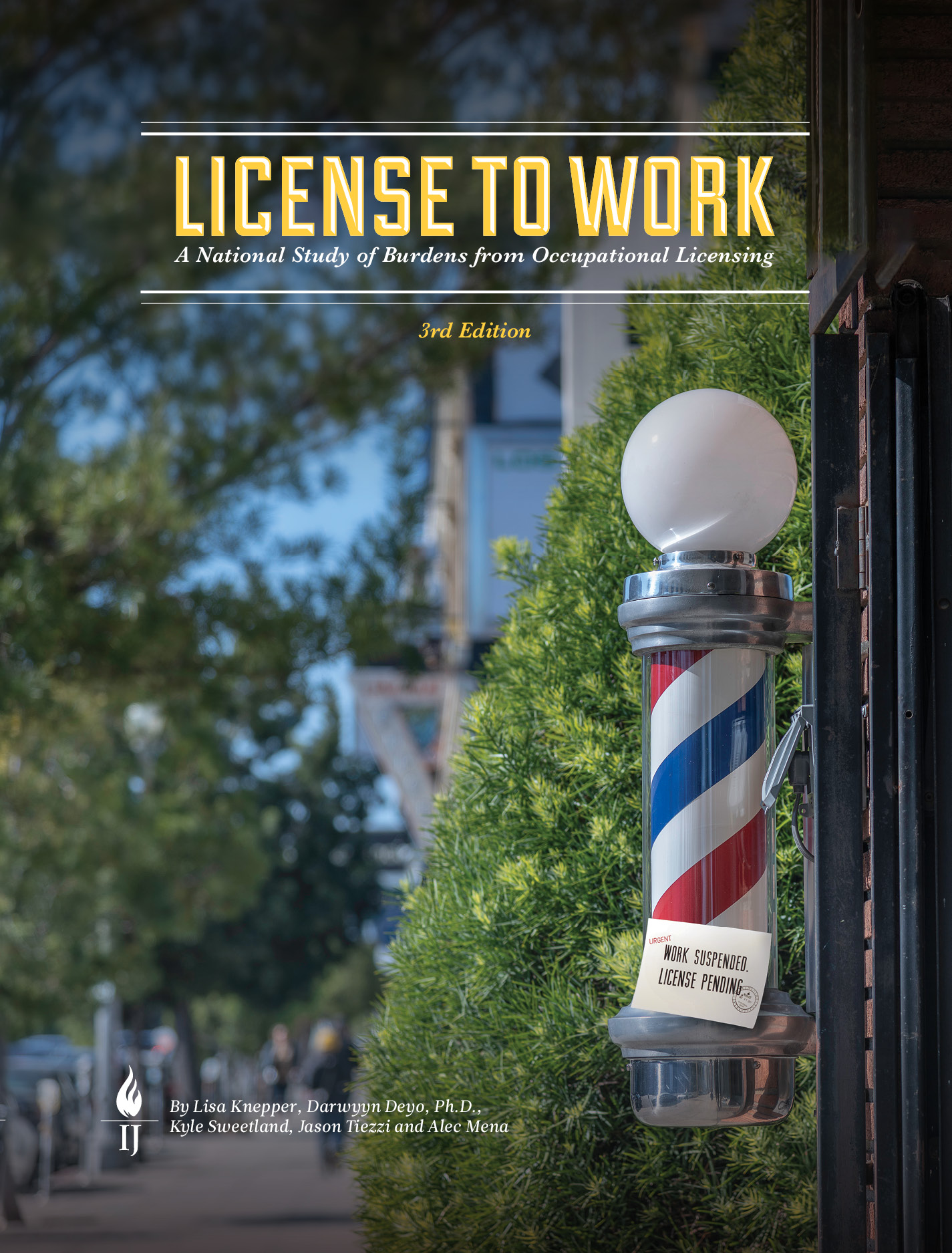Drywall Installation Contractor (Residential) Occupational Licensing
License required in 30 states
45th most burdensome licensing requirements among moderate-income occupations
Average Fee for License:$292
What They Do
Drywall installation contractors, also known as hanger contractors, contract with clients to apply plasterboard or other wallboard to ceilings or interior walls of buildings and apply or mount acoustical tiles or blocks, strips or sheets of shock-absorbing materials to ceilings and walls of buildings to reduce or reflect sound. The materials may be of decorative quality. The category includes lathers who fasten wooden, metal or rockboard lath to walls, ceilings or partitions of buildings to provide a support base for plaster, fireproofing or acoustical material. Typically, only contractors require licenses, not the drywall installers who work for them. In some states, licensing requirements differ based on the setting. Those with a residential license may work only on residential properties, while those with a commercial license may work on commercial properties. Other states require the same license regardless of the setting, and this report records that license in both settings. Many states have contract minimums before the contractor’s license applies. See Appendix B for details.
Drywall Installation Contractor (Residential) Licensing Overview
Thirty states (more than half of states) require a licence to work as a Drywall Installation Contractor (Residential). On average, these laws require $292 in fees, 319 days of education and about 1 exam. Drywall Installation Contractor (Residential) Licenses have the 45th most burdensome requirements of the 102 occupations studied.
Where is a Drywall Installation Contractor (Residential) the most regulated?
Out of the 30 states that require an occupational license, an occupational license for a Drywall Installation Contractor (Residential) has the highest burden in California. California requires $579 in fees, 3 exams, 4 years experience, and no education.
Where is a Drywall Installation Contractor (Residential) the least regulated?
Out of the 30 states that require an occupational license, an occupational license for a Drywall Installation Contractor (Residential) has the lowest burden in Nebraska. Nebraska requires $0 in fees, no exams, no experience, and no education.
Where is a Drywall Installation Contractor (Residential) license the most expensive?
An occupational license for a Drywall Installation Contractor (Residential) costs the most in Nevada. Nevada requires $995 in fees, 1 exams, 4 years experience, and no education.
Where is a Drywall Installation Contractor (Residential) license the least expensive?
An occupational license for a Drywall Installation Contractor (Residential) costs the least in Nebraska. Nebraska requires $0 in fees, no exams, no experience, and no education.
Where does it take the longest to obtain a Drywall Installation Contractor (Residential) license?
An occupational license for a Drywall Installation Contractor (Residential) takes the longest to obtain in California, Nevada, Hawaii, Florida.It takes 1460 days (4 years).
Where is it fastest to obtain a Drywall Installation Contractor (Residential) license?
An occupational license for a Drywall Installation Contractor (Residential) takes the least time to obtain in Arizona, North Carolina, Tennessee, North Dakota, District of Columbia, West Virginia, Alabama, Alaska, Louisiana, Connecticut, Washington, New Jersey, Iowa, Arkansas, Idaho, Pennsylvania, Nebraska (0 days).
What states require exams for a Drywall Installation Contractor (Residential) license?
To obtain an occupational license for a Drywall Installation Contractor (Residential) there is at least one exam required in: California, Nevada, Hawaii, Florida, Massachusetts, New Mexico, Maryland, Virginia, Arizona, Mississippi, Oregon, North Carolina, Tennessee, West Virginia. California requires 3 exams.
Thirty states license drywall installation contractors working on residential properties. On average, states require over a year (368 days) of education and experience, $313 in fees, and about one exam. All in all, 16 states require at least one exam (California requires three). These requirements rank as the 42nd most burdensome.
States Ranked by Average Licensing Burden for 102 Lower-Income Occupations
More Burdensome Less Burdensome
Based on data released in November 2022| Burden Rank | State | Occupations Licensed | Fees | Estimated Calendar Days Lost | Education | Experience | Exams | Minimum Grade | Minimum Age |
|---|---|---|---|---|---|---|---|---|---|
| 1 | California | 75 | $579 | 1460 | None | 4 years | 3 | 0 | 18 |
| 2 | Nevada | 75 | $995 | 1460 | None | 4 years | 1 | 0 | 18 |
| 3 | Hawaii | 64 | $694 | 1460 | None | 4 years | 2 | 0 | 18 |
| 4 | Florida | 55 | $364 | 1460 | None | 4 years | 1 | 0 | 18 |
| 5 | Massachusetts | 50 | $500 | 1095 | None | 3 years | 1 | 0 | 18 |
| 6 | New Mexico | 66 | $324 | 730 | None | 2 years | 2 | 0 | 18 |
| 7 | Maryland | 58 | $433 | 730 | None | 2 years | 1 | 0 | 18 |
| 8 | Virginia | 72 | $320 | 731 | 8 clock hours | 2 years | 1 | 0 | 18 |
| 9 | South Carolina | 60 | $50 | 365 | None | 1 years | 0 | 0 | 0 |
| 10 | Arizona | 68 | $546 | 0 | None | None | 2 | 0 | 18 |
| 11 | Mississippi | 65 | $290 | 67 | None | 3 jobs, contractors | 2 | 0 | 0 |
| 12 | Oregon | 69 | $310 | 3 | 16 clock hours | None | 1 | 0 | 18 |
| 13 | North Carolina | 66 | $154 | 0 | None | None | 1 | 0 | 18 |
| 14 | Rhode Island | 70 | $200 | 0.8 | 5 clock hours | None | 0 | 0 | 18 |
| 15 | Tennessee | 69 | $307 | 0 | None | None | 1 | 0 | 0 |
| 16 | North Dakota | 65 | $100 | 0 | None | None | 0 | 0 | 18 |
| 17 | District of Columbia | 61 | $442 | 0 | None | None | 0 | 0 | 0 |
| 18 | Utah | 64 | $405 | 4 | 25 clock hours | None | 0 | 0 | 0 |
| 19 | West Virginia | 67 | $142 | 0 | None | None | 1 | 0 | 0 |
| 20 | Alabama | 63 | $350 | 0 | None | None | 0 | 0 | 0 |
| 20 | Alaska | 64 | $350 | 0 | None | None | 0 | 0 | 0 |
| 22 | Louisiana | 77 | $255 | 0 | None | None | 0 | 0 | 0 |
| 23 | Connecticut | 65 | $220 | 0 | None | None | 0 | 0 | 0 |
| 24 | Washington | 76 | $118 | 0 | None | None | 0 | 0 | 0 |
| 25 | New Jersey | 54 | $110 | 0 | None | None | 0 | 0 | 0 |
| 26 | Iowa | 71 | $50 | 0 | None | None | 0 | 0 | 0 |
| 27 | Arkansas | 72 | $50 | 0 | None | None | 0 | 0 | 0 |
| 27 | Idaho | 66 | $50 | 0 | None | None | 0 | 0 | 0 |
| 27 | Pennsylvania | 50 | $50 | 0 | None | None | 0 | 0 | 0 |
| 30 | Nebraska | 61 | $0 | 0 | None | None | 0 | 0 | 0 |

License to Work
The data and information here come from IJ’s License to Work report, released in November 2022.
View Report

